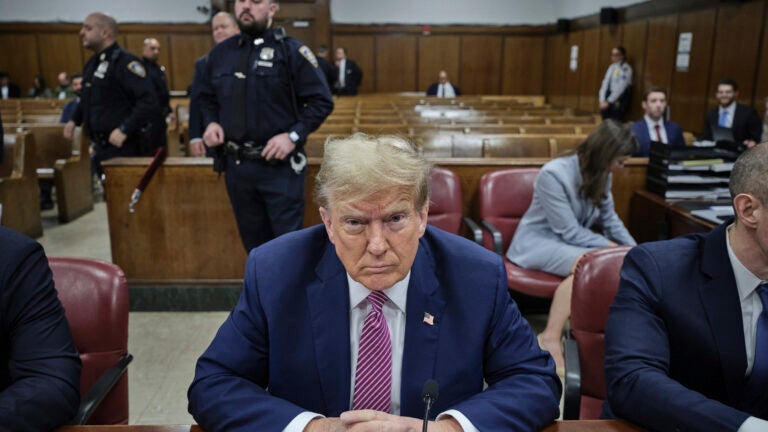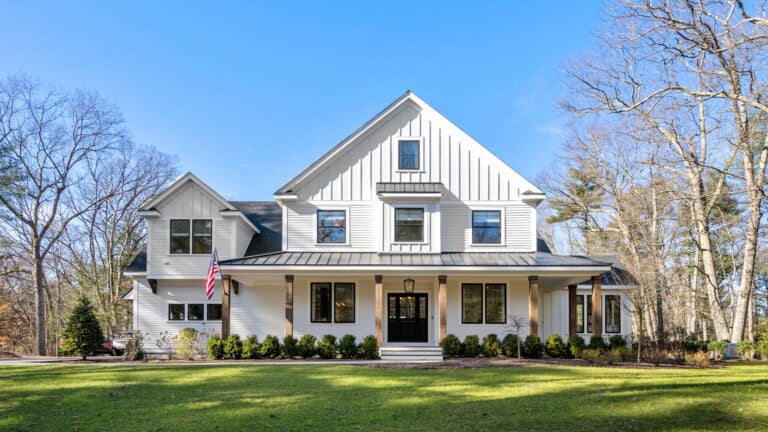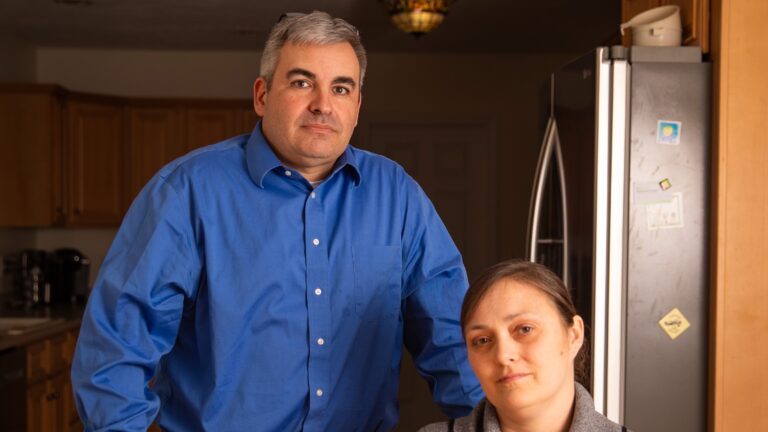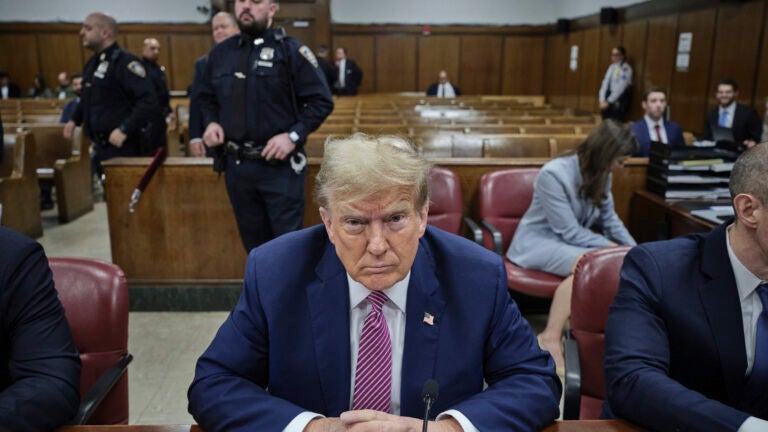3 things to know about Bill Weld’s possible 2020 campaign against Donald Trump
"I cannot sit quietly on the sidelines any longer."
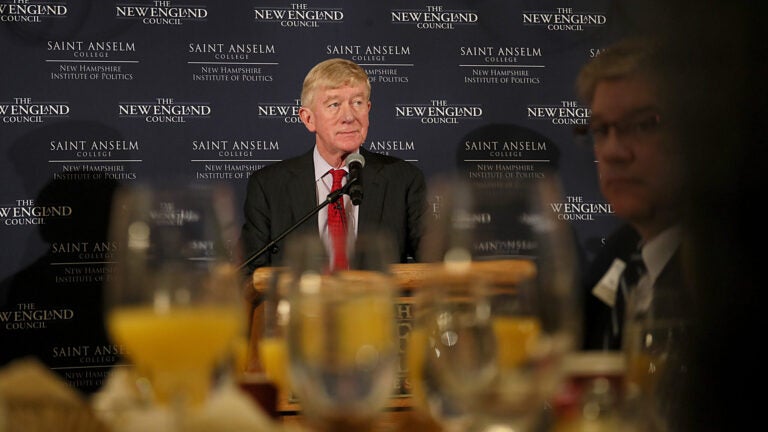
Calling President Donald Trump “unstable,” former Massachusetts Gov. Bill Weld became the first Republican to announce a potential 2020 primary challenge against the incumbent president.
Weld, who was the 2016 vice presidential nominee for the Libertarian Party, said he was forming a presidential exploratory committee to fulfill what he characterized as his own civic duty to not “sit passively as our precious democracy slips quietly into darkness.”
“I’m here because I think our country is in grave peril, and I cannot sit quietly on the sidelines any longer,” the 73-year-old former governor said Friday morning at the New England Council’s “Politics & Eggs” speaker series in Bedford, New Hampshire.
A recent Morning Consult poll found that 33 percent of Republicans said they would “likely vote for a GOP challenger” in 2020 over Trump, who has proved to be a historically unpopular president, yet has maintained a nearly 90 percent approval rating among members of his own party. History shows that incumbent presidents have almost always been able to fend off serious primary challengers — but often go on to lose the general election.
Weld may not be the last Republican to jump into the race against Trump. But during Friday’s speech he outlined what his unique campaign — the latest episode in a long, quixotic political career — would look like:
1. Weld’s rhetoric fits in nicely with the #Resistance
Shortly before the 2016 election, Weld made the unusual move as part of a third-party ticket to publicly vouch for then-Democratic presidential nominee Hillary Clinton while imploring voters not to back Trump, who he compared to a child and called “the worst of American politics.”
Trump’s two years in the Oval Office apparently haven’t done much to change Weld’s view.
“We have a president whose priorities are skewed toward promotion of himself rather than toward the good of the country,” he said Friday. “He may have great energy and considerable raw talent, but he does not use them in ways that promote democracy, truth, justice, and equal opportunity for all.”
Weld went on to call Trump “unstable” and said the country has “wasted an enormous amount of time by humoring this president, indulging him in his narcissism and his compulsive, irrational behaviors.” He specifically criticized the Trump administration’s annual trillion-dollar deficits and tax cuts for the rich.
“And they call themselves conservatives,” Weld said. “That’s a trillion dollars of debt for our children and grandchildren to pay off. That’s not fair, to put it mildly, to members of the X-generation or to millennials.”
The former Bay State governor, who recently switched his party registration back to Republican, also singled out GOP leaders for supporting Trump.
“They say the president has captured the Republican party in Washington. Sad,” he said. “But even sadder is that many Republicans exhibit all the symptoms of Stockholm Syndrome, identifying with their captor. … We don’t need six more years of the antics we have seen. We need to make a change, and install leaders who know that character counts.”
2. But he still has very conservative (economic) views
Just because Weld is blasting Trump and his Republican allies doesn’t mean he’s lining up with Democrats.
While he does support gay rights, abortion rights, and the legalization of marijuana, Weld is staunchly conservative on fiscal matters. During his speech Friday, he hit the Democratic Party’s left wing, where he said “socialism seems to have replaced any notion of spending restraint.”
“We need the opposite of socialism,” Weld said. “In the federal budget, the two most important tasks are to cut spending and to cut taxes – and spending comes first.”
Weld called for the federal government to “zero-base” its budget, meaning that all appropriations would have to be paid for in each given year, which was a core tenet of his 2016 campaign with Libertarian presidential nominee Gary Johnson. Weld also plugged his time as governor of Massachusetts, during which he said he earned national recognition for cutting state spending.
“The best way to deal with government spending is to deal with it as Smokey the Bear recommends dealing with fire: keep it small, keep it in a confined area, and keep it under observation,” he said.
Weld — who does not run away from the fact that he comes from a family of historic inherited wealth — also called for the repeal of the federal estate tax and cutting the capital gains tax rate to 10 percent — arguing that “both have the perverse effect of penalizing people for a lifetime of hard work.” He also proposed simplifying the tax code, including a flat 19 percent income tax.
“I believe the savings from the dramatic simplification of the Internal Revenue Code and the whole process of taxation would be enormous,” he said.
3. He isn’t ‘extreme’ on everything
“I think of myself as an extreme on both fiscal policy and social policy,” Weld said last year.
But as someone whose political career has been defined by his breaks from the party line, there were a number of notable proposals in which Weld continues to cut from the Republican — and even Libertarian — orthodoxy. He said Congress should stop “fruitlessly” debating the repeal of the Affordable Care Act in favor of other smaller health care reforms and called for compromise on immigration.
Despite his tough-on-crime record as governor, Weld said Congress should build on the recently passed First Step crime reform bill with bail reform and more funding for reentry programs.
Weld also spoke of the “pressing need to act on climate change” and said the country should rejoin the Paris climate agreement (from which Trump withdrew the United States). The Trump administration’s approach to the environment and climate change is, he said, “antithetical to every principle of conservation and conservatism, and every tenet of Theodore Roosevelt’s Grand Old Party.”
“We must protect our economy, yes, but we must also recognize that increased natural disasters and unfamiliar weather patterns threaten to strip the snow from our White Mountains, and to melt all the mountain glaciers worldwide upon which hundreds of millions of people depend for their only source of water,” Weld said. “Europe has its cathedrals and monuments; we have our mountains, canyons, valleys, rivers and streams — and we had damn well better take care of them.”
However, Weld sees the most immediate domestic issue as addressing the predicted job losses due to automation and re-educating workers for the new economy.
“This is not caused by the unseen hands of globalization or the internet, but rather by the soon to be all-too-visible hands of robotics, drones, machine learning, artificial intelligence, and autonomous vehicles,” he said.
“The old jobs will be replaced by new and different jobs, but the problem is that today’s workers don’t yet possess the skillsets that the replacement jobs will require,” Weld continued. “This truly is a national emergency, and it’s going to require a nationwide response.”
While he thinks the country should consider abolishing the Department of Education in favor of more local control and charter schools, Weld proposed making in-state tuition free for displaced workers at two-year post-secondary schools and encouraging online classes (to mitigate the cost of room and board).
Weld said his program — something that was a part of Clinton’s education plan in 2016 — would amount to a “tiny budget adjustment.” He also said students should be able to refinance their college loans, a proposal that has been spearheaded in Congress by Sen. Elizabeth Warren.
“If we don’t do this, the door to the middle class may be closed to the working poor,” Weld said of his education proposals. “That would be an end game that we as a society cannot afford.”
